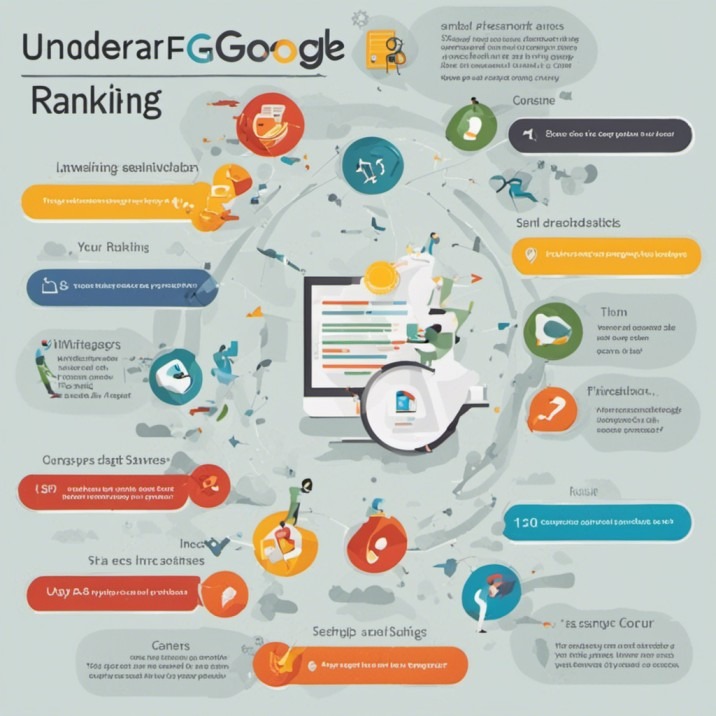
People Also Ask: Understanding Google’s SERP Ranking Factors
Oct 1, 2023
As internet users, we’ve all typed queries into Google’s search bar, hoping to find relevant information quickly. But have you ever wondered how Google determines which websites appear on the first page of search results for a given query? Many factors are at play in Google’s complex algorithm that are not always obvious. Understanding these ranking factors can help website owners optimize their sites to rank higher in search engine results pages, or SERPs.
Before delving into the intricacies of the ‘People Also Ask’ section, it’s vital to understand the cornerstone of Google’s SERP ranking factors. These factors constitute the criteria by which Google’s algorithm assesses and ranks websites, considering their relevance and quality concerning a user’s search query. Failing to meet these foundational criteria renders the ‘People Also Ask’ section inconsequential.
Content Quality: Crafting a Compelling Digital Narrative
In the intricate tapestry of Google’s ranking algorithm, one thread stands out above all: content quality. Imagine your website as a captivating novel, and each page is a chapter. Google is the discerning reader, and it’s seeking pages that grab attention and hold it throughout the journey.
High-quality content is your key to winning Google’s favour. It’s not just about words on a webpage; it’s about creating an immersive experience for your readers. Every sentence should resonate with clarity and relevance, drawing visitors into a world of valuable information.
The power of content quality extends beyond eloquence. It’s about understanding your audience’s needs and addressing them with precision. Google’s algorithm, ever the vigilant critic, scans for keywords that resonate with user intent. But it’s not a matter of sprinkling them liberally. The magic lies in seamless integration, where keywords enhance the narrative, not overpower it.
Furthermore, depth is essential. In-depth content showcases your expertise and authority in your field. Google recognizes and rewards the thorough exploration of topics, making it imperative to leave no stone unturned.
In the fast-paced digital realm, staying up-to-date is non-negotiable. Google’s algorithm favours fresh content, reflecting the ever-evolving nature of information. Regular updates not only please the algorithm but also demonstrate your commitment to providing readers with the latest insights.
Content quality isn’t just a ranking factor; it’s your invitation to engage, inform, and inspire your audience. It’s the cornerstone upon which digital success is built, and when wielded masterfully, it can elevate your website to new heights in the digital landscape.
Backlinks Unveiled: Your Gateway to Digital Authority
In the intricate SEO world, backlinks are the golden threads that weave the web together. Imagine them as digital endorsements from other websites, serving as a testament to your site’s trustworthiness and authority. Google, the discerning judge of the online realm, takes these endorsements seriously. It’s not just about the number of links; it’s about their quality and the credibility of the sources.
Quality backlinks are akin to recommendations from experts in a given field. When reputable websites link to yours, Google interprets this as a vote of confidence in your content. These virtual nods of approval are like nods from industry leaders, elevating your website’s status in the digital hierarchy.
However, the pursuit of quality backlinks is an art. It’s not about amassing a sheer quantity but about cultivating relationships with influential websites that share your niche. Each high-quality backlink is like a diamond in your digital crown, and they can significantly enhance your website’s visibility and rankings.
Imagine your website as a library, and each backlink is a reference from a well-regarded scholar. Google recognizes this and values the depth and breadth of your references. It’s a testament to the depth of your knowledge and the extent of your reach within your niche.
In essence, backlinks bridge your website and the broader digital landscape. They are your tickets to the upper echelons of Google’s search results. Building a network of quality backlinks is not just an SEO strategy; it’s the journey towards establishing your site as an authority in your field.
Page Load Speed: Accelerating Your Digital Journey
Every second counts in the fast-paced world of the internet, and page load speed is your website’s express lane to success. Think of it as the welcome mat to your digital abode. Google, the vigilant gatekeeper of the web, recognizes the value of this swift welcome.
A slow-loading website is akin to a sluggish handshake, leaving visitors impatient and likely to bounce away. A high bounce rate diminishes user experience and sends distress signals to Google, affecting your rankings in this digital race; speed matters, and Google rewards websites that can keep up with the pace.
Picture a well-organized, lightning-fast website as a smoothly flowing river, guiding users seamlessly through their online journey. Google’s algorithm, ever the advocate for user satisfaction, acknowledges the importance of a snappy user experience.
But it’s not just about appeasing the algorithm. It’s about embracing the essence of the digital era, where instant gratification is the norm. A fast-loading website keeps users engaged and encourages them to explore further, ultimately boosting your site’s rankings.
Google understands that users are likelier to return when they enjoy a swift and hassle-free experience. In this digital age, where attention spans are fleeting, speed is not just a ranking factor; it’s your key to creating lasting digital connections.
Page load speed is the gateway to a vibrant and dynamic online presence. It’s not just about impressing Google; it’s about offering your visitors an experience that keeps them returning for more. So, in this digital race, remember, the faster you go, the further you’ll soar.
Mobile Friendliness: Navigating the Mobile-First Frontier
In the age of smartphones and tablets, the digital landscape has undergone a seismic shift towards mobile accessibility. Google, the gatekeeper of the online world, recognizes this transformation and places a premium on mobile-friendly websites. It’s no longer just an option; it’s a digital imperative.
Imagine your website as a versatile chameleon, effortlessly adapting to different screen sizes and devices: Google values this adaptability, a critical factor in your website’s ranking. Responsiveness and accessibility are the pillars of mobile friendliness, ensuring that users on various devices experience your content seamlessly.
The importance of mobile friendliness extends beyond rankings; it’s about enhancing the user experience. In an era where people are always on the move, your website should be a reliable companion, easily accessible at their fingertips.
A mobile-friendly website is like a well-tailored suit, fitting perfectly on any screen, from the smallest smartphone to the most giant tablet. Google’s algorithm recognizes and rewards this adaptability by boosting your website’s visibility.
But it’s not just about appeasing the algorithm; it’s about connecting with your audience. A mobile-friendly website retains visitors and encourages them to engage and explore. It’s about creating an online presence that transcends device boundaries.
User Experience: Crafting Digital Delight
In the digital realm, user experience reigns supreme, and it’s your website’s opportunity to shine. Think of it as the art of creating a virtual haven where every visitor feels welcome and at ease. Google, the judge of online quality, places a high premium on this digital hospitality.
Imagine your website as an inviting storefront with a clear, well-lit entrance. User experience is about making visitors feel at home, starting with easy navigation. Google understands that users value simplicity and rewards websites that offer intuitive pathways to explore content.
A clear site structure is like the blueprint of your digital mansion. It not only makes navigation a breeze but also organizes information logically. Google’s algorithm recognizes the importance of structure, as it helps users find what they seek efficiently.
A secure HTTPS connection is the digital lock on your website’s door, ensuring visitors that their information is safe. Google prioritizes online security, and a secure connection is a user trust signal and a ranking factor.
But user experience transcends algorithms; it’s about creating a lasting impression. A well-designed, user-friendly website keeps visitors engaged and encourages them to return. It’s about building digital relationships that go beyond the transactional.
User experience is the art of digital hospitality, and Google values this commitment to visitors. It’s not just about rankings; it’s about creating a virtual space where users feel valued, respected, and inspired. So, as you navigate the digital landscape, remember that a positive user experience is the compass that guides visitors to your digital doorstep and encourages them to stay awhile.
Relevance: The Digital Compass for Navigating Google’s Terrain
In the vast expanse of the internet, relevance is your compass, guiding you through Google’s intricate landscape. Imagine your content as a treasure map and Google as the discerning explorer searching for the hidden gems. Relevance is the key to unlocking the treasure trove of higher rankings.
Google’s algorithm is a keen investigator, scrutinizing your content to determine how closely it aligns with the user’s search intent. Every search query is like a unique path, and your content must be the signpost that leads users to their desired destination.
But relevance isn’t just about sprinkling keywords; it’s about understanding the user’s journey. It’s about anticipating their needs and questions and addressing them with precision. Google rewards content that resonates with the searcher’s intent, ensuring that each click is a step closer to their answer.
Imagine your content as the answer to a question and Google as the inquisitive mind seeking knowledge. The more your content aligns with the user’s query, the more favourably Google perceives it. It’s a digital dance where your content should lead with grace.
Relevance isn’t just a ranking factor; it’s your invitation to engage, inform, and assist your audience. It’s about becoming the trusted source of information that users turn to when seeking answers. In essence, relevance is the North Star that helps you navigate Google’s terrain, ensuring your content reaches the right audience and resonates with their unique needs.
Technical SEO: Elevating Your Digital Foundation
In the digital realm, the foundation of your website is built on a complex infrastructure of technical elements. Think of it as the unseen gears and mechanisms that power your online presence. Technical SEO is the art of fine-tuning these critical components to ensure your website functions flawlessly and shines brightly in the eyes of Google.
Imagine your website as a well-constructed skyscraper towering above the digital landscape. Technical SEO is the structural engineer, ensuring that every beam, every joint, and every foundation stone is precisely in place. This meticulous optimization improves your site’s visibility, making it stand out among the digital skyline.
Meta tags are the blueprints of your digital content, providing vital information to both users and search engines. Properly optimizing them is like offering a well-organized map of your website’s treasures. Google recognizes this attention to detail and rewards it with enhanced visibility in search results.
Headings are the signposts that guide users through your content. They create a logical hierarchy, making it easier for both readers and search engines to understand your message. Google’s algorithm values this clear structure, contributing to a better user experience.
Image alt text is the voice of your visuals, describing them to sighted and visually impaired users. It’s like providing a vivid tour guide for your images. Google acknowledges the importance of inclusivity and rewards websites that make their content accessible to all.
But technical SEO goes beyond algorithms; it’s about creating a seamless digital experience. A well-optimized website not only pleases Google but also engages visitors, keeping them on your site longer.
Technical SEO is the unsung hero of the digital world, ensuring that your website operates efficiently and shines brilliantly. It’s about setting a solid foundation that allows your content to soar to new heights in the digital sky. So, as you embark on your digital journey, remember that technical SEO is the compass that points the way to online success.
Mastering the Digital Tides: Your Path to SEO Success
Understanding and harnessing the power of these SERP ranking factors can give your website a formidable advantage in the dynamic realm of online search. Yet, the journey doesn’t end with optimization; it’s a perpetual voyage.
Continuous vigilance and adaptation to Google’s ever-evolving algorithm updates are the sails that propel your website forward. It’s not just about reaching the summit; it’s about maintaining your position and striving for greater heights.
Think of your website as a vessel navigating the digital seas and Google’s algorithm as the ever-shifting currents. Staying attuned to these changes allows you to adjust your course, ensuring you stay on the right path to success.
In this fast-paced digital landscape, stagnation is the enemy. Adaptation is your ally, ensuring your website survives and thrives amidst the waves of change. So, as you embark on this digital odyssey, remember that the journey is as important as the destination, and the key to maintaining and improving your rankings lies in your ability to evolve with the tides of Google’s algorithm updates.
Exploring Google’s People Also Ask Feature
Google’s “People Also Ask” feature provides valuable insights into how the search engine prioritizes websites. This feature typically appears on the right side of SERPs, and lists related questions that other users have frequently asked concerning the original search query. Google’s algorithm diligently analyzes query data to present questions it deems most relevant, aiming to assist searchers in finding additional context or information. Websites that address these associated questions with comprehensive, high-quality content often experience an improvement in their search rankings.
To further understand the impact of “People Also Ask” on SEO and SERP ranking, it’s crucial to delve into the intricacies of this feature. When users click on one of the questions listed in “People Also Ask,” it expands to provide a concise answer and additional related questions. This user-friendly interface enhances the search experience by offering a spectrum of relevant queries closely tied to the user’s initial search intent.
Incorporating “People Also Ask” into your SEO strategy can be a strategic move. Creating content that addresses the primary search query and comprehensively covers related questions can increase your website’s visibility and relevance in Google’s SERPs. It’s a dynamic aspect of search optimization that continues to evolve, making it essential for digital marketers and content creators to adapt and harness its potential.
Deciphering Google’s ‘People Also Ask’ Selection Process
Have you ever wondered how Google determines which questions make it into the “People also ask” section? It’s a fascinating process driven by Google’s commitment to delivering the most informative and comprehensive responses to users’ queries. The questions featured in this section are those others have frequently searched with similar inquiries. By showcasing these natural follow-up questions, Google simplifies the exploration of topics for searchers, allowing them to delve deeper with minimal effort. Google’s ultimate goal is to guide searchers to websites that best fulfil their information needs.
According to Mozcast, the “People also ask” feature appears in more than 85% of searches, highlighting its significance. Google suggests that these questions can provide searchers with additional research ideas, emphasizing their importance. Notably, Google has secured a U.S. patent for selecting questions for the “People also ask” section and its methodology is grounded in actual search queries in question format.
Essentially, the “People also ask” section provides valuable insights into the potential buying journeys of your prospects. Consequently, it becomes an invaluable resource when optimizing for virtually any keyword query. Google meticulously analyzes vast amounts of search query data to identify questions that are frequently associated with specific search terms. By presenting these related questions, Google aims to offer searchers a more comprehensive view to satisfy their information needs with minimal clicks.
This selection process is even more intriguing because it considers direct question-query pairings and the common paths searchers follow after viewing initial results. If searches for a particular term consistently lead to questions on a related topic, Google may highlight these questions, proactively providing searchers with additional context. This user-centric approach simplifies the search experience and empowers website owners with valuable insights into opportunities for expanding content to provide thorough information on topics of interest to searchers.
Curious About What People Also Ask For?
When optimizing a website, it is crucial to understand the types of questions people commonly ask search engines. By analyzing query data, we can identify recurring themes and gain insights into the information users are seeking. These insights can help websites rise in Google’s search results and attract more organic traffic.
One common question that people ask search engines is for definitions or explanations of concepts, processes, and terms they are unfamiliar with. Users turn to Google to gain a better understanding of various subjects and to expand their knowledge. By crafting content that directly addresses these questions and provides clear explanations, websites can position themselves as authoritative sources and attract relevant traffic.
Another popular category of questions revolves around recommendations, ratings, and reviews of products and services. Consumers often seek guidance when purchasing decisions and rely on search engines to provide reliable information. Websites that offer comprehensive reviews, comparisons, and recommendations can establish themselves as trusted sources and capture the attention of potential customers.
Additionally, practical “how-to” questions are highly sought after by users. People frequently search engines for step-by-step instructions on solving problems or accomplishing specific tasks. Websites that provide detailed and actionable guides can become go-to resources for users seeking practical solutions.
Websites can gain a competitive edge in search engine rankings by crafting content that directly addresses these common questions. Understanding users’ information needs and providing valuable answers can help websites attract more organic traffic and establish themselves as authoritative sources in their respective fields.
Additional SEO Content Queries from Users
Before we dive into the tactics and data essential for ranking in the ‘People Also Ask’ boxes, let’s first discuss the overarching strategy. In semantic SEO, the array of tactics available seems nearly infinite. To avoid burnout, it’s crucial to construct a system that yields significant benefits for your business in the shortest possible time frame.
Once you’ve devised such a strategy, you can explore other opportunities. ‘People Also Ask’ boxes can potentially deliver targeted, quick wins with minimal implementation effort.
In a recent interview with Jason Barnard, he shared how he leveraged the PAA box to expand his client’s brand reach. This approach proves effective when there are PAA questions related to your brand (we’ll cover what to do if there aren’t any questions about your brand later).
The strategy is straightforward:
- Enter your brand name into Google and examine the ‘People Also Ask’ box.
- Are any of the ‘People Also Ask’ questions about your brand? If so, your brand must provide answers to all those questions.
- Failing to do so means another brand might capture clicks away from your site, potentially diverting your most valuable prospects—those searching for your brand name on Google.
- To prevent this, include an FAQ section on your site that comprehensively addresses all questions related to your brand (details on how to do this will be explained later in the post).
- Regularly check your brand keywords; if new questions emerge, address them.
To discover additional questions Google suggests about your site, search for all the questions listed in the PAA box on your brand’s SERP. You might uncover more questions about your brand or your industry. Be diligent in addressing all these questions in your FAQ section.
Once you’ve covered all questions about your brand, or if there are no PAA questions, focus on answering all questions related to your niche. This ongoing process can yield quick wins, especially for branded queries.
Unlocking Google’s Puzzling People Also Ask Ranking Factors
In summary, the factors that influence a website’s prominent appearance in the “People also ask” section of SERPs:
Addressing User Queries: Websites that effectively address questions that are frequently searched for with the main query are more likely to be featured. Google aims to provide users with comprehensive information, so aligning your content with these commonly searched questions is crucial. Addressing user queries enhances visibility and establishes authority in your niche, becoming a go-to source for information seekers.
High-Quality Responses: It’s not just about addressing questions; the responses provided should be thorough, well-written, and informative. Google prioritizes content that adds substantial value to the user’s understanding of the topic. Crafting high-quality responses not only boosts your SEO but also positions you as a trusted expert, earning credibility among your audience.
Optimizing Content: To increase your chances of appearing in the “People also ask” section, consider optimizing your web pages around the questions in this section. This can involve using relevant keywords, structured formatting, and clear headings. Effective content optimization isn’t just about rankings; it’s about creating a user-friendly experience that keeps visitors engaged and returning for more.
User Experience: Ensuring your content is easily accessible, well-organized, and user-friendly is vital. A seamless user experience can encourage users to stay on your site longer and engage with your content. It’s not just about visibility; it’s about providing a delightful journey for your audience, leaving them satisfied and eager to explore further.”
By grasping Google’s intention to assist users with additional queries and by focusing on addressing common user questions, websites can enhance their ranking potential. This benefits the site’s visibility for the original query and positions it favourably for related queries that users may explore. Ultimately, this approach improves a website’s discoverability and ability to fulfil a broader range of users’ information needs through Google.
People Also Ask Google SERP Ranking Factor Conclusion
In closing, the “People also ask” section on Google SERPs provides valuable signals into additional questions searchers have that the website may be able to answer. Thoroughly addressing these prompts helps satisfy more users’ information needs while potentially boosting rankings—the questions Google features are determined by analytics of common related queries. By optimizing content strategically around these prompts and other general ranking factors, websites can enhance their discoverability and reach the top of search results for target keywords and associated search queries. The ultimate goal is to provide the most helpful, comprehensive responses possible to fulfil what people search for.
In-Depth Insights: Articles that Go Beyond the Headlines

Sophisticated Strategies: How to Start Saving for Retirement at 40

Unraveling the Enigma: How Do Savings Bonds Work and Mature?

Clear Proof Millennials Are Dumbest Generation

Third Wave Feminism Criticism: Valid Points Amidst the Debate

Investor Sentiment in the Stock Market: Maximizing Its Use

Mastering the Art of Retirement: How to Start Saving for Retirement at 45 with Grace and Style

Third Wave Feminism is Toxic: Its Impact on America

What is the Average Student Loan Debt in the US? Understanding the Crisis

Student Debt Crisis Solutions: Halting the Madness is Essential

Financial Freedom Reverse Mortgage: A Sophisticated Strategy for a Comfortable Retirement

Early Retirement Extreme: A Philosophical and Practical Guide to Financial Independence

Student Loan Refinance: A Smart Move Towards Financial Freedom – Poise in Debt Reduction

How to Lose Money: The Dangers of Ignoring Market Trends and Psychology in Stock Investing

How much has the stock market gone up in 2023? -A Refined Analysis

The Best Turkish Food in Istanbul: Exploring Culinary Delights
Stock Market Correction History: Decoding Illusions Behind Crashes


